13 must-have travel app features
Alex Ragin
Updated May 14, 2024 • 12 min read
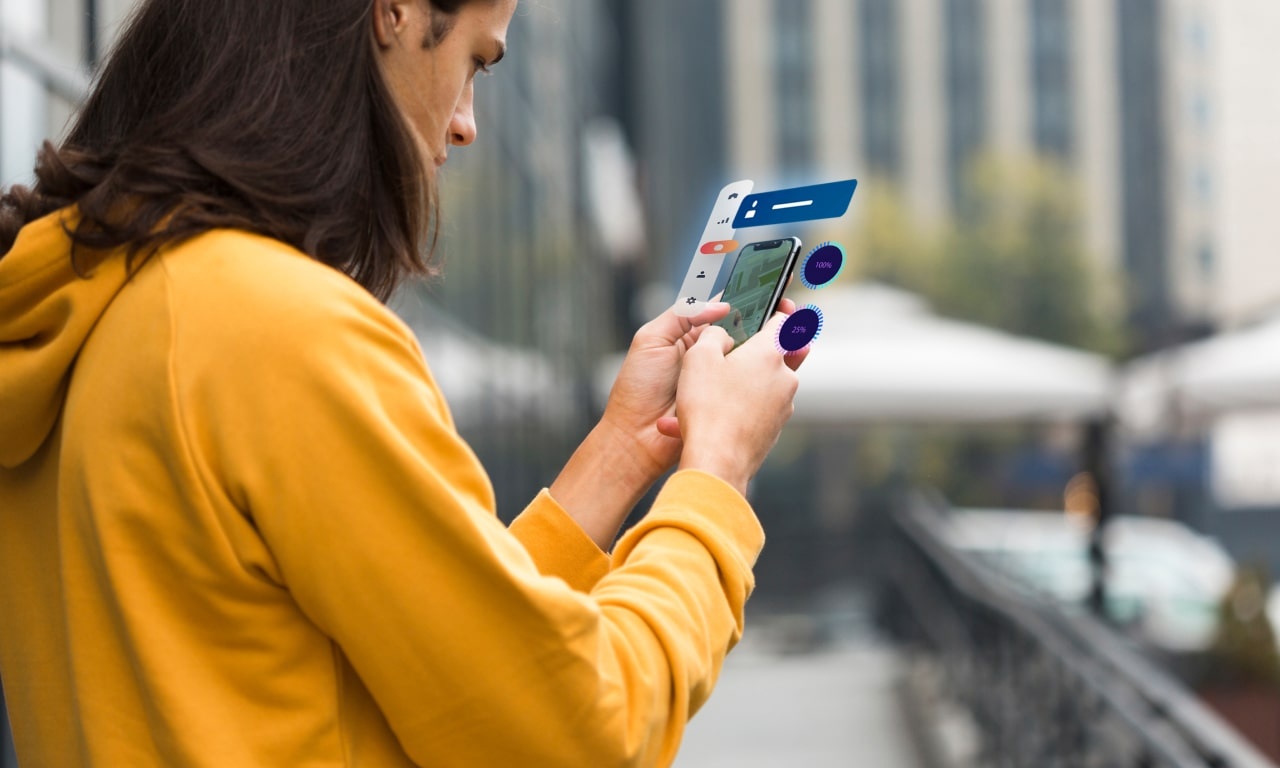
Nowadays, modern travelers rely on apps for every aspect of their holidays. They use them to research and book flights and apartments, learn about destinations, check upcoming weather predictions, keep an eye on currency exchange rates, and so much more. As a travel business, you are expected to make all of this possible from your app.
So what features should you include? During the travel application development process, you have the chance to select and prioritize the functionalities you want in your travel app, and there are certainly some that you won’t want to overlook. If you’re ready to create a successful travel app that will thrive in today’s tourism industry, you’ve come to the right place — let’s dive into the list.
Top features for all travel apps
High-quality content
The best travel apps are filled with beautiful, eye-catching content. Vibrant photos and videos of tourist attractions, sleek logos and illustrations, and captivating descriptions are not just great additions to your app — they showcase your key offerings and are absolutely necessary if you want to set yourself apart in the travel and tourism industry.
Users are accustomed to seeing high-quality rich content in their social media platforms and travel apps, so anything less will disappoint them. Rich content keeps customers engaged and interested in your services, increases their awareness of your brand, and works as an advertisement and promotion tool for improving the overall image and reputation of your travel business. Additionally, our travel app development services focus on integrating this type of high-impact visual content to enhance user experience and engagement.
User authentication
User authentication is among the most important travel app features for both personalization and security reasons.
First of all, user authentication can provide travelers with unique personal profiles, to which they can save their data, preferences, and payment methods for unparalleled convenience. This then enables you to host loyalty programs and create personalized offers.
Secondly, your app has to keep users' private data safe: from their payment info to their preferences and settings. With alphanumeric passwords and two-step authentication, your customers can rest assured that their information isn’t at risk from hackers.
To make the authentication process simpler and less intrusive, you can implement a social media login option, which allows users to connect to your app through their social media accounts like Facebook.
Ready to implement these priority features of a travel app?
Contact us and get our expertise.
Offline access
Offline access can enable users to see their travel itinerary, access booking details, use maps, and contact customer support without internet connection. When it comes to refining your perfect travel application feature set, offline access is certainly one of the most valuable.
Network conditions can vary depending on the travel destination, so don’t let your users lose access to important information. Ensuring that everything a traveler needs is stored securely inside their phone will make your app invaluable — and give users good reason to stick with it.
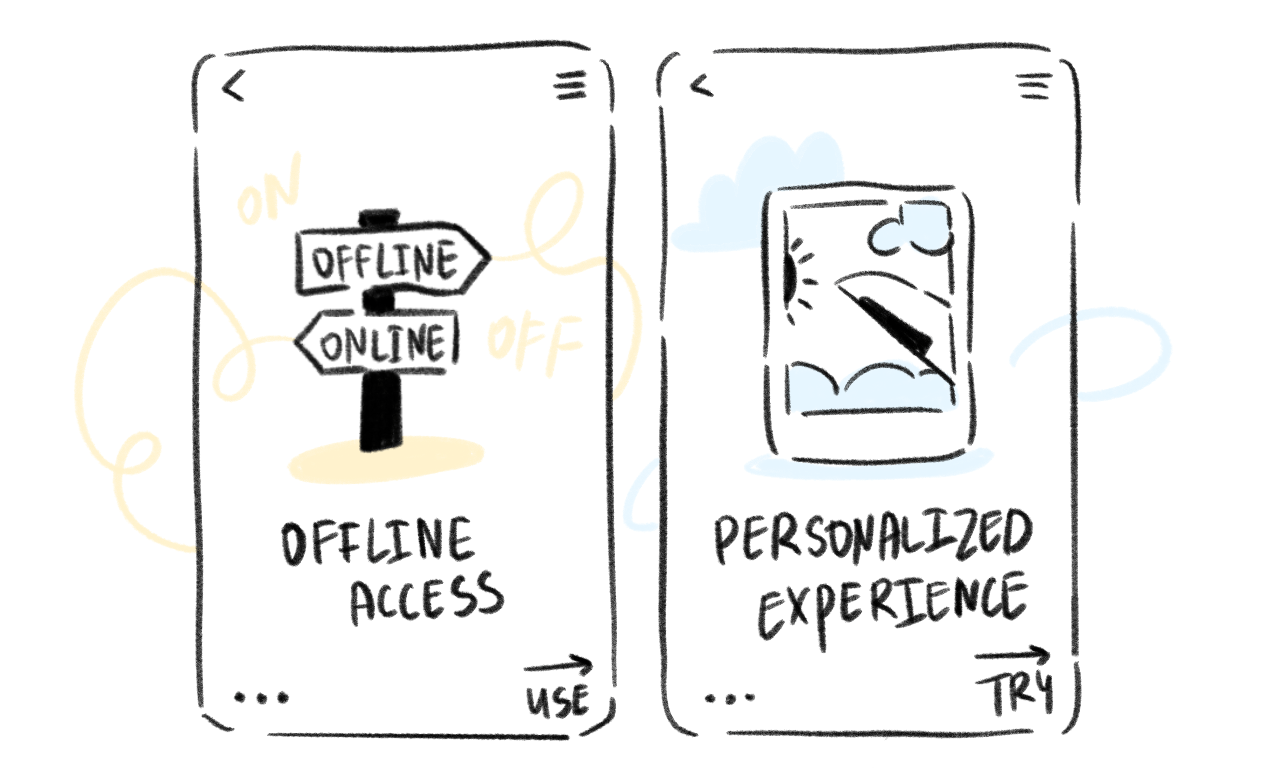
Users will also appreciate not having to pay for expensive mobile data just to access their booking information.
Reviews and ratings
When users plan their trips in a world filled with insidiously covert ads (the travel industry is notorious), they prefer to read reviews and rely on ratings made by other travelers to help them make their choices. A rating and review system is an important feature for helping users make informed and confident decisions.
Your app could have its own system, or simply use the free data provided by popular websites like Tripadvisor and integrate those trip reviews. Either way, if you want to build trust with your audience, implementing other travelers' reviews is one of the smartest ideas.
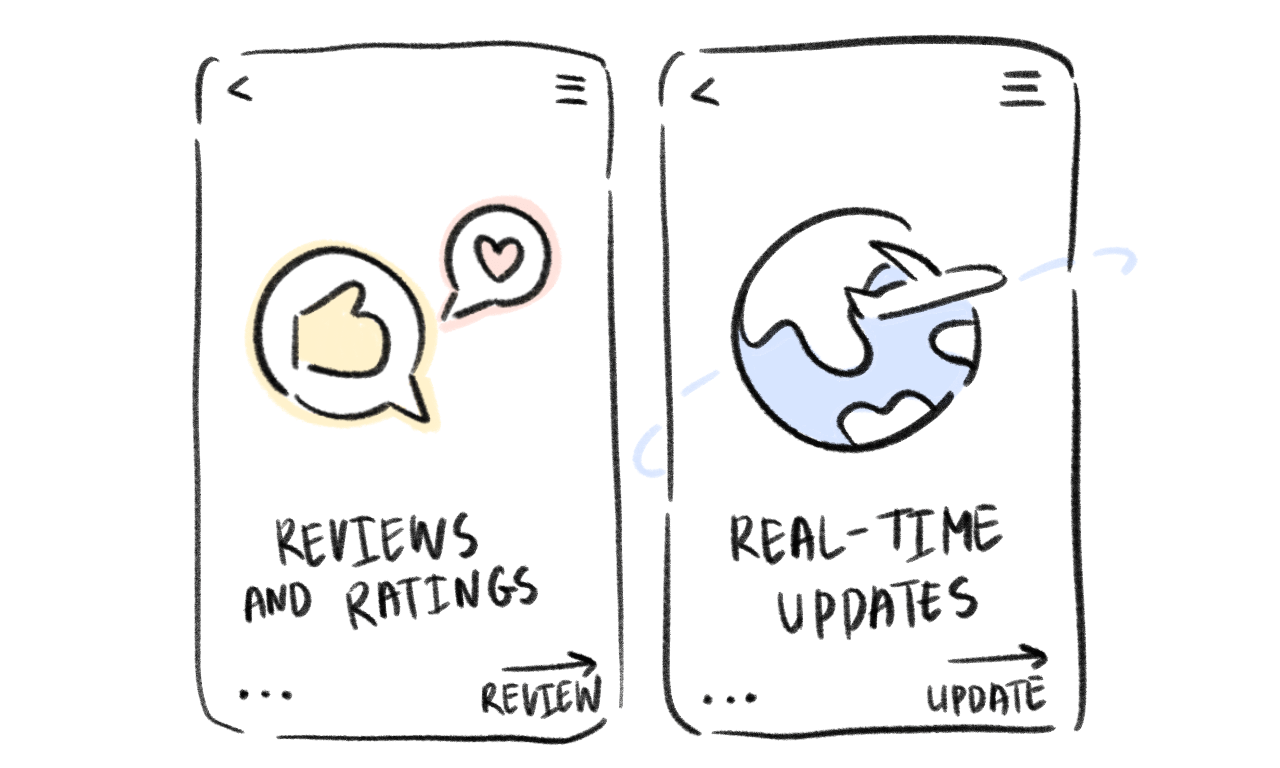
This functionality also helps travel businesses by giving them feedback on services and service providers, so they know what can be improved. This sort of feedback can be invaluable, which is why many companies invest in travel app review tools and incentivize their users to write reviews in exchange for discounts and bonuses.
Personalized experience
Personalization can factor into several features of a travel app, enhancing travelers’ satisfaction and loyalty.
Modern leisure and business travelers are accustomed to mobile apps that serve like social profiles, that understand their needs and preferences, and can provide them with relevant and tailored recommendations. They also expect mobile apps to adapt to their behavior and feedback, and learn from their past trips.
Creating a personalized experience within your travel app is a must. Users should be able to customize their profiles and set their preferences, such as their budget, interests and travel style, to receive relevant suggestions. Personalization directly correlates with customer satisfaction and loyalty — the more adaptive and helpful an app is, and the more customization opportunities you can provide users, the more likely they are to enjoy using it and keep coming back to it.
Customer support
Speaking of customer satisfaction, a customer support tool is another one of the most essential features for a travel app.
Travelers may encounter several problems during their trips: booking errors, flight delays, lost luggage — the list goes on. They may also have questions about visa requirements, travel insurance, cancellation policies, or app functions. Wherever they are in the world, you want your customers to feel safe and comfortable, and there is nothing more irritating than encountering a problem and not getting a satisfactory response from the service provider.
That is why any travel app should come with customer support functionality. You could build an in-app messenger to allow travelers to get in touch with your agents quickly and easily. Or consider adding an FAQ section or knowledge hub covering the most common issues and their solutions.
User-friendly interface
The best travel apps are extremely intuitive and easy to navigate, so that even non-tech-savvy users can find their way around with ease. User-friendly interfaces are especially important for travel apps since travel agencies often have highly diverse customer bases.
To cater to all needs, your app should be inclusive and accessible. That means it should have intuitive controls, clear menus, and simple, straightforward steps for every action. You could also add a voice search or dark mode to increase users’ comfort.
From a business perspective, the more inclusive your travel app is, the wider the target audience it can attract.
Real-time updates
Trips are rarely set in stone, as circumstances can change at the last minute. A good travel app should be able to adjust to unexpected circumstances and provide travelers with relevant information at any given time.
Make sure to enable real-time updates on flight statuses and travel alerts, include a weather forecasting tool, and utilize geo-tracking services to offer current location based emergency services. But you don’t have to build these features yourself — use APIs to implement them or create the latter with the help of Google Maps SDK.
Just remember, it isn’t always enough to offer these features in-app — a traveler should be made aware of any important updates (from weather warnings to price drops) through helpful push notifications.
Push notifications are one of the most essential travel application features, since they give travelers reason to keep your travel app on their phones. Even without opening your app, users will get real value from your helpful, timely alerts. In turn, they will view your app as a reliable and convenient tool.
Top features for booking and transportation apps
Advanced search
Nowadays, travelers like to book entire trips through apps, so it’s important to give them the tools to find exclusive deals and select the best options to suit their budgets and preferences.
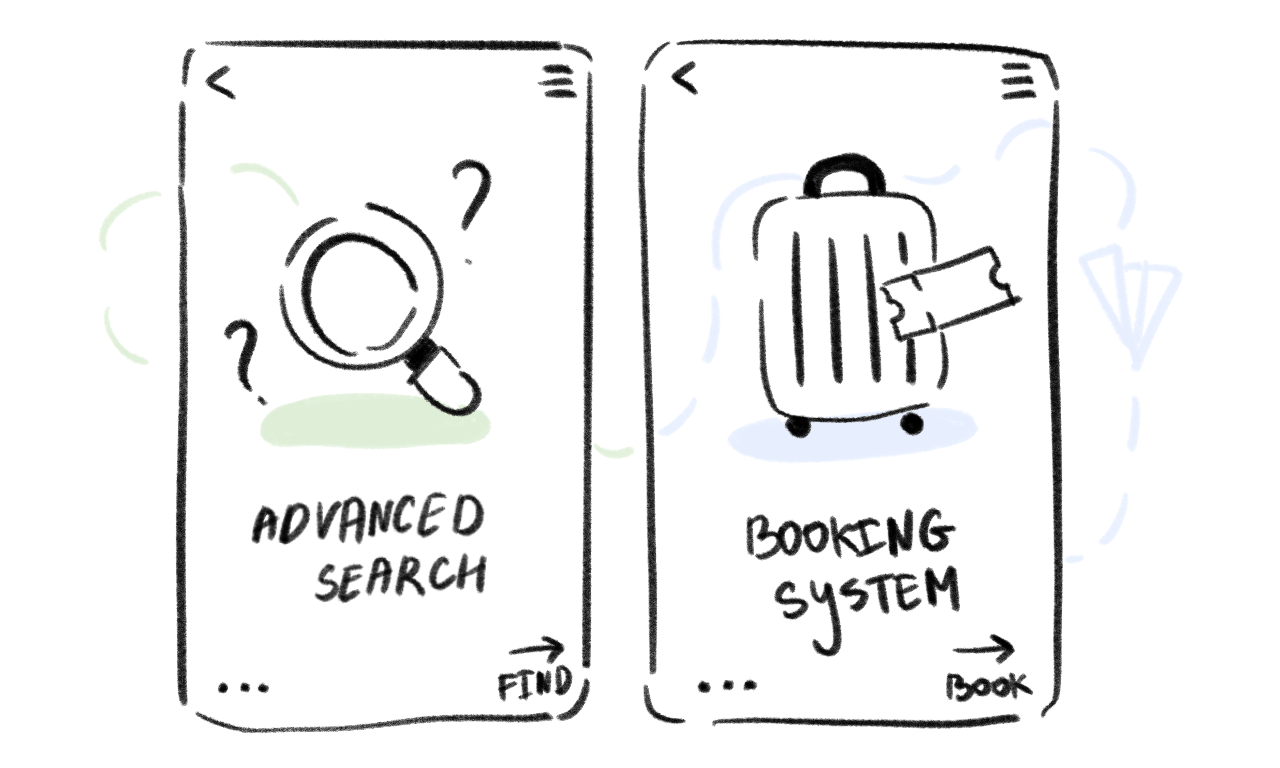
A good travel app should come with a powerful and flexible search and filter function. This should allow travelers to input or select various pieces of information (the more the better), like their preferred destination, dates, budget, accommodation type, activity type, and so on, and then generate a refined results list. And travelers should be able to sort the results to see the options that are most relevant — for example, by lowest price or highest rating.
An advanced search speeds everything up and makes looking for specific tours or services much less of a hassle. Think about it like this: the less time it takes for a customer to do the ‘discovery’ work, the quicker they book with you. But an advanced search isn’t just a ‘nice to have’ — it’s a necessity, since most major travel companies offer this feature.
Payment gateways
One of the top features to include in your travel app is a secure and convenient payment gateway for in-app purchases.
Why? Well, first of all, a secure gateway will leave users feeling confident in parting with their hard-earned money and sharing their personal information with you — after all, it is your duty to guarantee that everything is completely safe and secure.
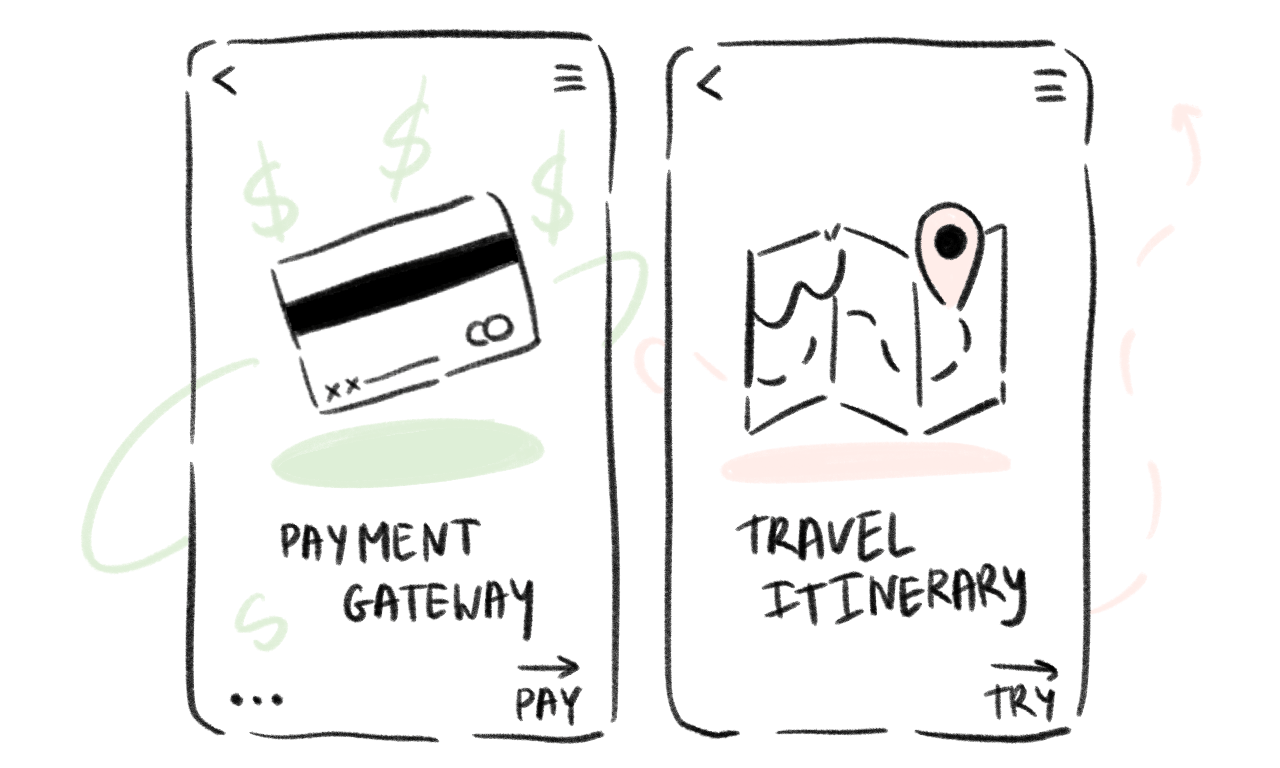
Secondly, a good payment gateway is convenient. Providing a comfortable way to pay in-app saves users time and means you get paid quicker. Make sure to offer multiple payment options (once again, the more the better), especially the most popular ones like credit cards, debit cards, Apple Pay, and Google Pay. Even better, allow your travelers to save their payment information so they don’t have to enter it each time they book.
Going a step further, you could include some sort of currency converter that can track current and past variations in currency rates to make paying through your travel app that little bit more enjoyable — the general rule is to ensure users don't close your app to complete other tasks. Give them everything they need to pay in one place.
Booking system
One of the most important travel mobile app features is a robust booking system that allows travelers to book services and products directly from your app. Travelers don’t want to have to switch between different apps or mobile websites to make a booking. They want a seamless, all-in-one booking system that also comes with booking modification or cancellation capabilities. And of course, it should keep their personal and financial information safe and secure.
Booking systems really are one of the most important features — they simplify and streamline the booking process for travelers and ensure they stick to using your app. They can also build trust, since a company with a quick, easy, and secure process from selection to checkout will appear professional and trustworthy.
Top features for concierge apps
Real-time chatbot
Travelers, especially in foreign countries, often find themselves in need of assistance, but due to the different time zones, they might not be able to reach your agents out of hours. Sometimes all they need is to get a grasp of a tricky feature you've implemented, while other times they might need urgent emergency services because of bad weather or other issues.
A chatbot that is available to provide quick answers and helpful resources 24/7 is something any traveler will find extremely helpful, especially in a concierge app. So many concierge mobile apps today have them, so you should integrate one too.
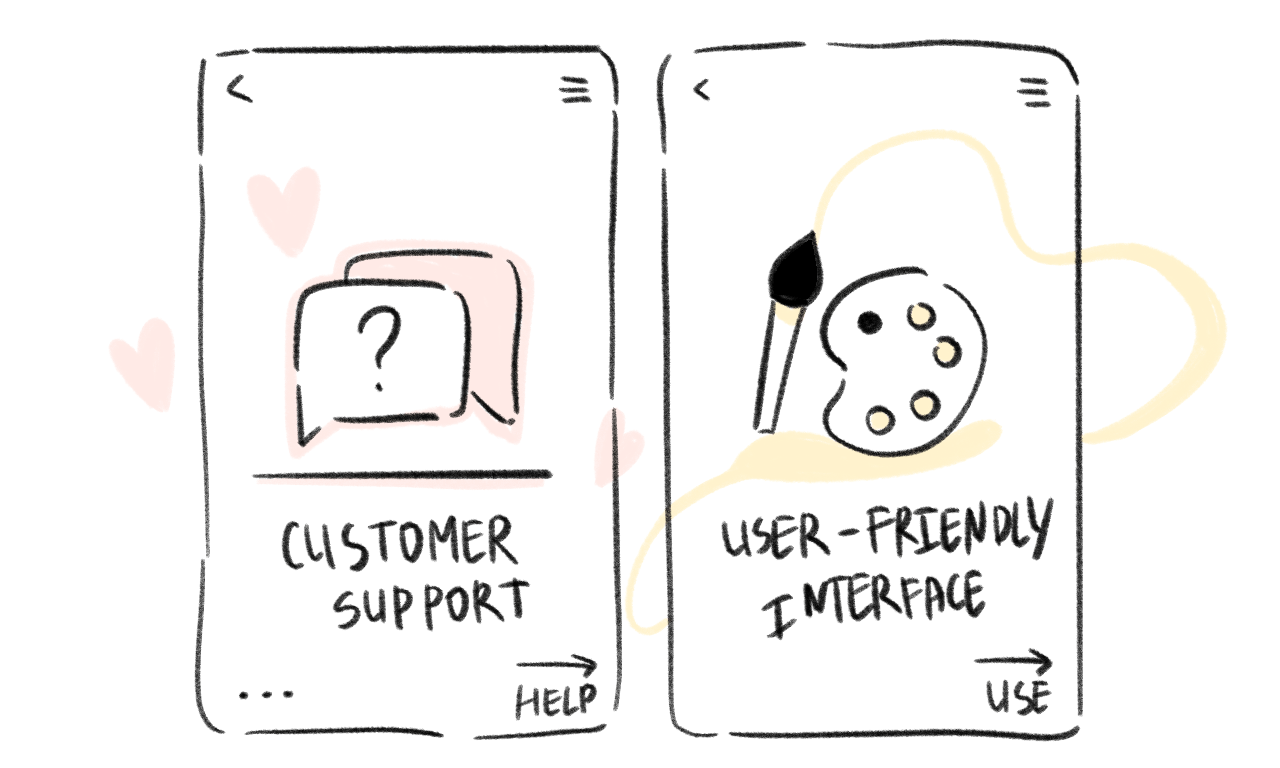
Nothing comes close to the assistance a chatbot can provide, except for real customer support specialists and AI-powered chatbots — the latter one is growing in popularity so be sure to jump on this trend as soon as you can. AI is taking chatbots to a whole new level, providing unparalleled convenience, natural language recognition, and detailed context-based responses.
Offline travel itinerary
One of our favorite must-have concierge app features is an offline travel itinerary generator that helps travelers with organizing and planning trips. Travelers want a clear and comprehensive overview of their trips plus access to all the small details: their flight tickets, hotel reservations, transportation services, bookings at restaurants, and info on excursions and tourist attractions. Essentially, they expect their entire tour or holiday laid out in front of them.
Keeping it all in one place — inside your app — is convenient and makes it more likely that users will keep your app on their smartphone for the duration of their trip and beyond, for future travels.
A great travel itinerary generator can also provide reminders or notifications of any changes or updates to trip details, such as flight delays, cancellations, or gate changes. Ideally, it should sync with Google Maps so travelers can add custom landmarks and reference points, with their calendars for timely reminders, and with other apps like TripAdvisor and Yelp.
Conclusion
Mobile apps are a necessity for travelers in today’s travel and tourism industry — they require them at all the stages of their trips. But developing a travel app that is just okay is not enough — you need to create an excellent one that leaves your travelers feeling satisfied, informed, cared for, and comfortable.
We’ve explored the most important features to help your travel mobile app stand out among the rest in the current tourism industry. The list includes personalization, booking systems, real-time updates, advanced search, offline access, and an itinerary generator.
While it might sound like a lot, most of these are travel industry standards that users expect. Keep in mind that implementing these features won’t only benefit your users, it’ll also benefit your business by increasing customer loyalty and generating insightful data and feedback.
Thankfully, it’s not always necessary to build these features from scratch — some already exist from other providers and can be integrated through APIs.
But if you want to go one step further, there’s nothing stopping you from building new and unique features for travelers' convenience. For example, you could add a weather forecasting feature that displays weather reports based on location (these tools are becoming more and more useful as we notice the effects of climate change). Users could also benefit from a currency converter or social media integration.
Got more questions about must-have travel app features?
Contact us and we’ll guide you through.
Related articles
Alex loves travel and tech and founded Zoftify to help travel companies use technology more effectively. Before this, he worked in tech consulting, where he led international mobile development teams.
4.91 (43)